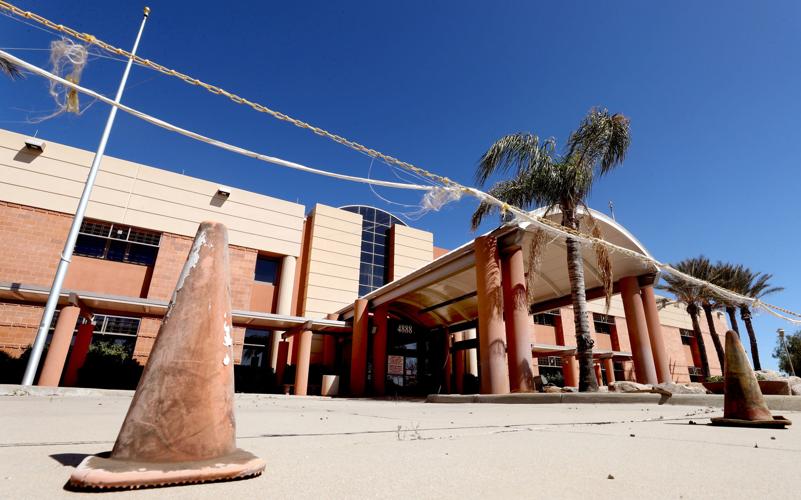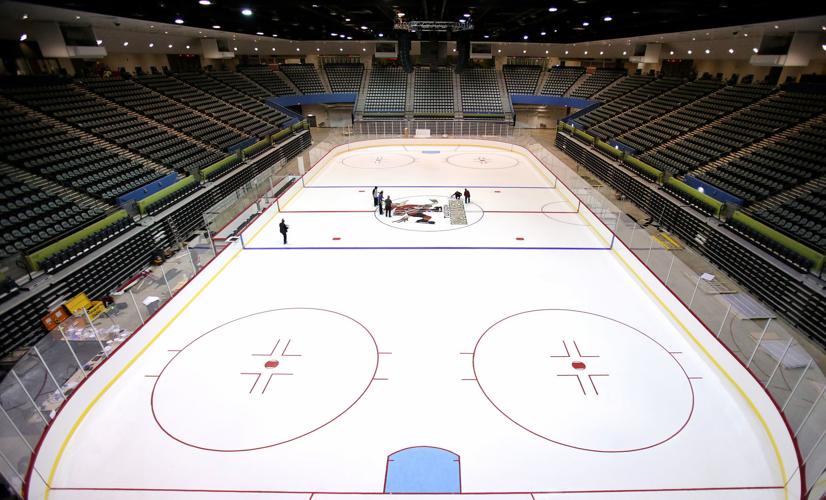Representatives from the Army Corps of Engineers were in Tucson last Friday to evaluate two locations that could potentially be used as alternate care facilities should the state see an extreme surge of hospitalizations as a result of the coronavirus.
Mechanical, electric and environmental engineers were among the officials who looked at the Tucson Convention Center and vacant Tucson Heart Hospital, evaluating everything from their roofs to air-conditioning systems to mechanical rooms.
The tours were done to assess the “highest level of care the facilities could support,” according to Dave Palmer, a spokesman for the Army Corps of Engineers, who said he could not reveal specifics of reports that were completed this week and sent to state and federal partners.
“We just assessed what this situation was,” Palmer said. “Those final decisions of what a facility can be used for — or will be used for — will be made at the state and federal level.”
State officials have tasked the Corps with traveling across Arizona to look at sites that could potentially serve as alternate care facilities in an effort to help offset what they’ve described as a shortage of “thousands of beds” in a worst-case pandemic scenario.
It’s up to the state to decide whether to use the facilities for COVID-19 patients, or to just ease the burden of normal daily hospital patients, Palmer said.
The Corps has looked at more than a dozen sites, including athletic facilities, empty hospitals and community centers in Phoenix, Tucson, Flagstaff and the Navajo Nation.
On Thursday, Gov. Doug Ducey announced the reopening of the vacant St. Luke’s Hospital in Phoenix to add 339 ICU beds, adding that officials are “finalizing an assessment of options to add additional hospital bed capacity in Pima and Coconino Counties and other parts of the state, if needed.”
Earlier this week, Dr. Cara Christ, the director of the state’s health department, reiterated that the department is looking to add 13,000 additional beds across Arizona, including 1,500 ICU beds.
Christ also said the state has initiated “scope-of-work requests” for other potential field hospitals, including one location in Southern Arizona that would provide 800-1,000 beds, but she did not provide any other specific details.
A representative from the state health department did not immediately respond to a request for comment on a time frame for when a decision will be made on any future alternative care facilities.
It remains unclear whether that refers to the Tucson Convention Center, which is downtown, or the Tucson Heart Hospital, which was vacated more than a half-decade ago at its location near North Stone Avenue and West River Road.
The TCC, which is owned by the Rio Nuevo downtown redevelopment district and leased by the city, has postponed more than 60 events, including hockey and indoor football games, as a result of the coronavirus.
Andrew Squire, a spokesman for the city, said the city is working with the Army Corps of Engineers and other government partners “to show them anything they want to see.”
“We’ll be more than willing to work with them as this moves forward and the need presents itself,” he said.
The Carondelet Health Network moved its Heart & Vascular Institute from the Tucson Heart Hospital to the west-side St. Mary’s Hospital after saying in 2012 the institute was not “financially sustainable” at the site and was outgrowing the facility.
A spokesman for Tenet Healthcare, which jointly owns Carondelet with Dignity Health and Ascension, said he had no information and that he isn’t sure if the company still owns the vacant hospital.
Photos for April 1: Tucson gets by during Coronavirus Pandemic
Tucson, coronavirus
Updated
A dinosaur statue over the doors of MATS Dojo at 5929 E. 22nd St., sports an athletic cup for a face mask in the second week of COVID-19 restrictions, March 31, 2020, Tucson, Ariz.
Tucson, coronavirus
Updated
A pair of protestors use their car to block west bound traffic on Silverlake to let other protestors make the left turn in into the Pima County Adult Detention Complex during a vehicle based demonstration by #FreeThemAll for the release of prisoners in light of the COVID-19 pandemic, March 31, 2020, Tucson, Ariz.
Tucson, coronavirus
Updated
Raj Paudel hands a bag of food to a customer at Govinda's to-go-tent located at 711 E. Blacklidge Drive, on April 1, 2020.
Tucson, coronavirus
Updated
The biggest hit to employment in Arizona came in the leisure and hospitality industry — hotels, bars, restaurants and places of amusement — which alone shed 5,200 jobs.
Tucson, coronavirus
Updated
John Aldecoa tapes up a banner outside his restaurant, Brother John's, as he and his staff get ready to serve again after being closed since the COVID-19 restrictions were put in place two weeks ago, April 1, 2020, Tucson, Ariz.
Tucson, coronavirus
Updated
Michael Olivas, right, helps Arnold Vizcaino, City of Tucson Parks and Recreation employees, lock up swings at Gene C. Reid Park, 900 S. Randolph Way, in Tucson, Ariz., on April 1, 2020. The City of Tucson Parks and Recreation employees are going around to all Tucson parks to close all ramadas, gazebos, playgrounds, outdoor fitness equipment, all sports courts and fields, horseshoe pits and splash pads due Coronavirus Disease (COVID-19).
Tucson, coronavirus
Updated
Caution tape across an entrance on a playground at Gene C. Reid Park, 900 S. Randolph Way, in Tucson, Ariz., on April 1, 2020. City of Tucson Parks and Recreation employees are closing all ramadas, gazebos, playgrounds, outdoor fitness equipment, sports courts and more due to the coronavirus outbreak.
Tucson, coronavirus
Updated
A "CLOSED' sign and caution tape is placed around a ramada at Gene C. Reid Park, 900 S. Randolph Way, in Tucson, Ariz., on April 1, 2020. The City of Tucson Parks and Recreation employees are going around to all Tucson parks to close all ramadas, gazebos, playgrounds, outdoor fitness equipment, all sports courts and fields, horseshoe pits and splash pads due Coronavirus Disease (COVID-19).
Tucson, coronavirus
Updated
Vanessa Richards, 18, left, and Ella Dotson, 17, adjust their mortar boards and hair in the window of a building along Scott Ave. in downtown Tucson on March 31, 2020. Due to the coronavirus (COVID-19) pandemic the rest of the school year has been canceled. Richards and Dotson are seniors at Marana High School and will not have a formal graduation ceremony. The pair came to downtown to get photos of themselves in their caps and gowns.
Tucson, coronavirus
Updated
Vanessa Richards, 18, left, and Ella Dotson, 17, take a selfie as their friend, Camilla Hamilton, 17, gets her photo taken by Vanessa’s mother, Chrissi, along Scott Ave. in downtown Tucson on March 31, 2020. Due to the coronavirus, the rest of the school year has been canceled. The Marana High School seniors went downtown to get photos of themselves in their caps and gowns.
Tucson, coronavirus
Updated
Georgia Goodwin, volunteer, sews masks for hospital workers and the community at Cathey's Sewing and Vacuum, 5701 E. Speedway Blvd., in Tucson, Ariz., on March 30, 2020. Cathey's Sewing and Vacuum have made roughly 2,000 masks, due to Coronavirus Disease (COVID-19), in one week for local hospitals in Southern Arizona.
Tucson, coronavirus
Updated
Along with other volunteers and employees, Paula Sanford, center, volunteer, sews masks for hospital workers and the community at Cathey's Sewing and Vacuum, 5701 E. Speedway Blvd., in Tucson, Ariz., on March 30, 2020. Cathey's Sewing and Vacuum have made roughly 2,000 masks, due to Coronavirus Disease (COVID-19), in one week for local hospitals in Southern Arizona.
Tucson, coronavirus
Updated
Andy Cathey, Cathey's Sewing and Vacuum employee, sews masks for hospital workers and the community at Cathey's Sewing and Vacuum, 5701 E. Speedway Blvd., in Tucson, Ariz., on March 30, 2020. Cathey's Sewing and Vacuum have made roughly 2,000 masks, due to Coronavirus Disease (COVID-19), in one week for local hospitals in Southern Arizona.
Tucson, coronavirus
Updated
Andy Cathey, Cathey's Sewing and Vacuum employee, sews masks for hospital workers and the community at Cathey's Sewing and Vacuum, 5701 E. Speedway Blvd., in Tucson, Ariz., on March 30, 2020. Cathey's Sewing and Vacuum have made roughly 2,000 masks, due to Coronavirus Disease (COVID-19), in one week for local hospitals in Southern Arizona.
Tucson, coronavirus
Updated
Rudy Arriaga, far left, and his mother, Dale, chat with Damian Velez, far right, general manager and Joseph Ashbacher before leaving with their takeout order at Bianchi's Italian Restaurant, 3640 W. Tangerine Road, in Marana, Ariz. on March 30, 2020. The Marana location will closed due to a drop in business.
Tucson, coronavirus
Updated
A man wearing personal protective equipment works out at FitCore at Morris K Udall Park, 7200 E. Tanque Verde Rd., in Tucson, Ariz., on March 29, 2020.
Tucson, coronavirus
Updated
Ruby Boulet-Stephenson waters the family's new backyard garden, on March 27, 2020.
Tucson, coronavirus
Updated
Roccos Little Chicago Pizzeria sports the phrase "Eat the Rich" on its marquee, on March 31, 2020. The local pizza spot is currently closed due to Coronavirus disease (COVID-19.)
Tucson, coronavirus
Updated
A pedestrian crosses Church Avenue near the Historic Pima County Courthouse in a nearly-empty downtown Tucson during the coronavirus pandemic in spring 2020.
Tucson, coronavirus
Updated
A bank customer wears gloves while at a drive up ATM at Chase Bank, 8701 E. Broadway Blvd., in Tucson, Ariz., on March 29, 2020.
Tucson, coronavirus
Updated
While traveling through Tucson, Canadians Lauri Buchanan and her husband Brian Buchanan, left, eat lunch with their friends Rhonda McDonald and her husband Pat McDonald, right, from Wyoming, outside of Whataburger, 6504 E. 22nd St., in Tucson, Ariz., on March 30, 2020. Mr. and Mrs. Buchanan and Mr. and Mrs. McDonald were eating outside due to Coronavirus Disease (COVID-19).
Tucson, coronavirus
Updated
David Cardinal, a sales associate at The Hub, works with a customer at the gun store located at 1400 S Alvernon Way, on March 28, 2020. The store saw an increase in customers during the last few weeks.
Tucson, coronavirus
Updated
An employee at The Hub, a gun store located at 1400 S Alvernon Way, works with a customer on March 28, 2020. The store saw an increase in customers during the last few weeks.
Tucson, coronavirus
Updated
Cassie Phelps, food service employee for Tucson Unified School District, hands two students lunches and breakfast at Harold Steel Elementary School, 700 S. Sarnoff Dr., in Tucson, Ariz., on March 31, 2020. TUSD is offering lunches and breakfast for students due to schools being canceled because of Coronavirus Disease (COVID-19).
Tucson, coronavirus
Updated
Jolene Luquin, teaching assistant for Tucson Unified School District, organizes educational packets for a parent at Harold Steel Elementary School, 700 S. Sarnoff Dr., in Tucson, Ariz., on March 31, 2020. The educational packets, for grades K-12, include the curriculum for all classes from science to math to history and others. It allows the students, parents and teachers to keep learning despite not being in the classroom, according to Karla Escamilla, TUSD public information officer. TUSD plans to have most of the paperwork online in the next couple of weeks, said Escamilla, as well as issue laptops to students who don't have access to a computer. TUSD is issuing these packets and online school due to Coronavirus Disease (COVID-19).
Tucson, coronavirus
Updated
After more than a week in isolation, Tami and Tedd Handy get the chance to dance as Mama Coal, Carra Stasney and Tim O'Connor give a street concert on Placita de Zacatal in the Casas Adobes neighborhood, Saturday, March 28, 2020, Tucson, Ariz.
Tucson, coronavirus
Updated
Mama Coal, Carra Stasney and Tim O'Connor take to the great outdoors along Moonshroud Dr., in Catalina Shadows, Saturday, March 28, 2020, Tucson, Ariz.





